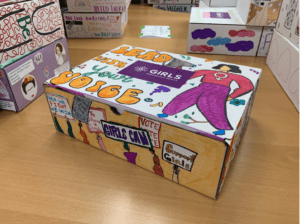 For twenty-five years, Girls Empowerment Network has been helping young women across Texas discover that they are unstoppable. They have done so by laser-focusing their curriculum on one critical component: building self-efficacy, which is a girl’s belief in her ability to succeed. On this episode of the Into the Fold, we are joined by Vanessa Beltran, newly hired Mental Health Policy Fellow for Girls Empowerment Network, and her policy mentor Dr. Sarah Miller-Fellows, Director of Impact, to discuss the unique challenges facing girls and how self-efficacy helps young leaders advocate for themselves and their communities.
For twenty-five years, Girls Empowerment Network has been helping young women across Texas discover that they are unstoppable. They have done so by laser-focusing their curriculum on one critical component: building self-efficacy, which is a girl’s belief in her ability to succeed. On this episode of the Into the Fold, we are joined by Vanessa Beltran, newly hired Mental Health Policy Fellow for Girls Empowerment Network, and her policy mentor Dr. Sarah Miller-Fellows, Director of Impact, to discuss the unique challenges facing girls and how self-efficacy helps young leaders advocate for themselves and their communities.
Challenges facing Girlhood
It is no secret that girls, especially girls of color, face unique challenges to believing in themselves. Sarah tells us that as early as the age of six, girls begin to “identify intelligence as a male trait.” Girls are also six times more likely than boys “to be told to be careful.” They are less likely to raise their hands in class, and more likely to be diagnosed with a mood disorder during adolescence — all of which sends repeated messages to young women that they do not have the ability to lead. This reality inspired a group of Texas parents to come together in 1996 and say enough is enough, “not my daughter, not anyone’s daughter.” The organization they founded – originally called The Ophelia Project, inspired by the book Reviving Ophelia – has become the Girls Empowerment Network, which has impacted the lives of more than 15,000 girls and their families each year through their summer camps, school-based programs, conferences, and now, virtual programming and activity kits.
Building Self-Efficacy through an Advocacy Framework
The Girls Empowerment Network uses an advocacy framework to support their self-efficacy curriculum. One of the key features of this framework is the concept of the “Six Cs.” These Six Cs are Confidence, Coping Skills, Collaboration, Communication, Critical Thinking, and Creativity. When girls put these Six Cs into practice, the impact is clear. Just one example resulted from a program called “Coping and Connection.” After surveying over 200 parents of girls during the pandemic who had previously gone through Girls Empowerment programming, Sarah and Vanessa saw that while there were incredible amounts of stress in these girl’s lives, there were also incredible examples of resilience. “They said that when they were stressed out, they used breathing exercises that they learned in their programs,” says Sarah. “When they were upset about not being able to see their friends every day, they were using coloring pages or doing some of the yoga poses that they had been taught.”
Sparking Change at Home and in Communities
Still, like so many during this pandemic, girls and their parents also reported struggling with unreliable Internet connections, making virtual classes difficult to attend. “They and their parents really wanted opportunities for peer connection and creativity, which resulted in the creation of the Spark Kit,” Sarah explains. The Spark Kits, now in their fourth iteration called the “Unstoppable Activist Spark Kit,” are designed for young girls and their families to explore and communicate their values and identities through at-home activities. “Really the goal of these Spark Kits is to help girls develop a critical self-awareness and gain confidence in their ability to exercise leadership,” says Vanessa, “As well as apply these key decision-making skills to generating progress on real world issues that they identify as affecting their communities.”
The Spark Change Project (SCP), a collaboration between Girls Empowerment Network and Excellence and Advancement Foundation (EAF), is a new 2021 pilot program that will challenge girls to put these skill into action. The goal of this project is to train and empower the next generation of female activists of color in Texas, who, as Sarah puts it, “will make change for their communities and raise awareness related to issues like mental and behavioral health services and access to those services, positive gender and racial identity development, building self-efficacy in adolescent girls, expanding support services for youth on the margins in Texas, and reducing the stress, isolation, and loneliness during the continued impacts of the COVID pandemic.” The first cohort for this program includes girls from Austin, Houston, and San Antonio who area working on a range of projects related to issues facing their communities, along with mentors who are also women of color. This is all leading up to a special Spark Change Day in the spring, and will culminate in the Spark Change Girls testifying at the 2023 Texas legislative session.
